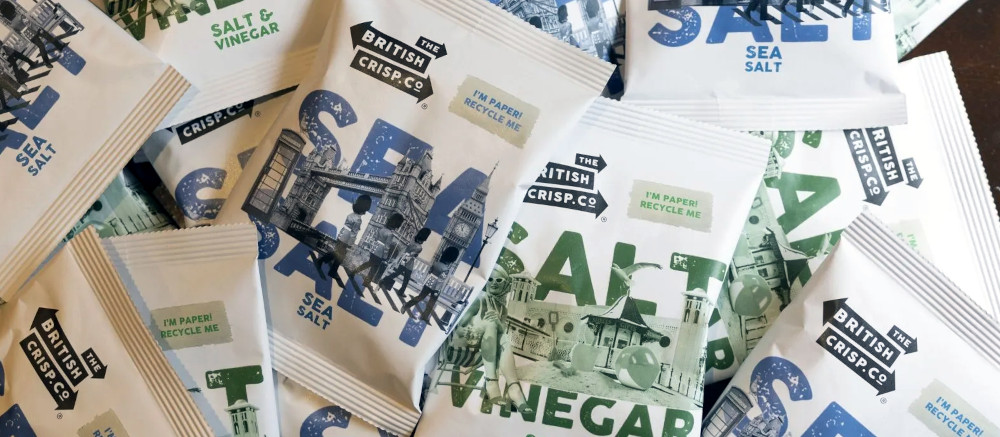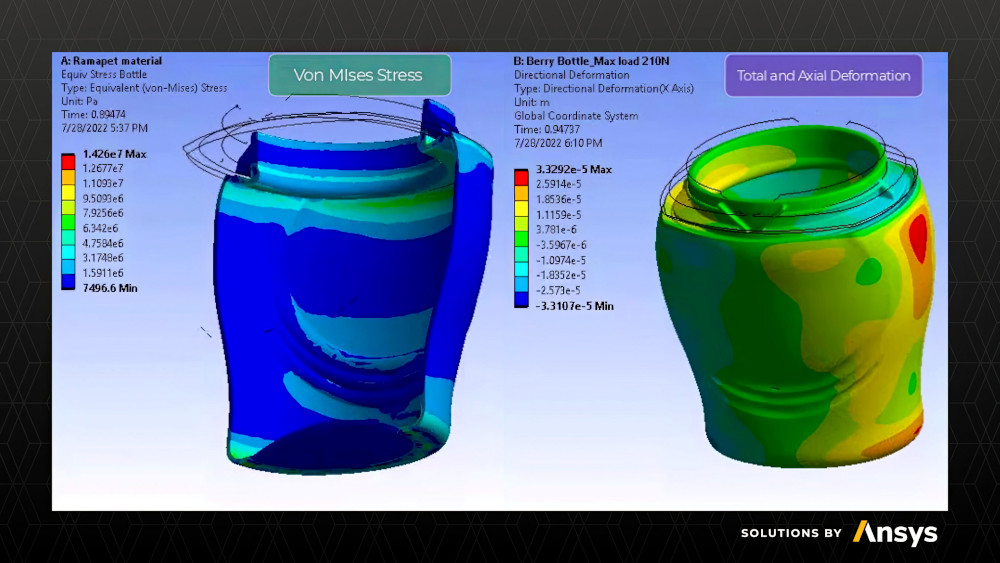Walkers, British Crisp Co unveil recyclable paper chip bags
 Image credit: British Crisp Co
Image credit: British Crisp Co
This week, UK chip brand Walkers (known as
Lay’s in the US, Canada and Australia) announced the rollout of
paper outer bags for all
multipacks
of its Snack a Jacks rice cakes — a step toward its goal of decreasing the
brand’s use of virgin plastic by 65 tonnes annually.
Building on the shift to recyclable paper packaging of brands such as Nestlé’s
Yes!,
Walkers’ new paper bags are designed for easy recycling at home and curbside
collections; and the company says the transition to paper bags is expected to
cut greenhouse gas (GHG) emissions per pack by 52 percent. Following the success
of paper outer packaging across Walkers Baked
multipacks,
Snack a Jacks is Walkers’ second brand to adopt the new format.
“Easily recycled with your usual household paper recycling, these new outer
packs can be disposed of thoughtfully with little fuss,” said Snack a Jacks’
marketing manager Hannah
Freeman. “We hope our
devoted fans of Snack A Jacks will enjoy this small but important change we’ve
made to make their snacking experience even more enjoyable at home.”
Walkers parent company, PepsiCo Europe, plans to eliminate fossil-based
plastic
in its chip and snack bags by 2030 by shifting to 100 percent recycled or
renewable materials, as part of PepsiCo
Positive (pep+)
— the snack giant’s health and sustainability transformation plan — toward its
overarching goal of achieving net-zero emissions by 2040.
“Our outer paper multi-bag packs are working well on Walkers Baked, giving us
the confidence to roll out this format across more of our snack brands,” said
PepsiCo’s UK packaging sustainability lead Gareth
Callan. “The new packaging
will help further reduce our non-fossil plastic use, while also helping to lower
our carbon footprint as we work towards our commitment to creating a world where
packaging never becomes waste.”
On a similar note, artisanal snackmaker British Crisp
Co has introduced its own fully recyclable paper
chip
bag
— developed in collaboration with paper-based packaging manufacturer
EvoPak and Aquapak
Polymers.
The new packaging, developed over three years, is a unique combination of paper,
aluminum and Hydropol™ – Aquapak’s
water-soluble, biodegradable, non-toxic and marine-safe creation that it says
has all the benefits of plastic, and enables recycling and multiple end-of-life
options.
The companies say the very thin layer of vacuum-deposited aluminum keeps the
crisps fresh but doesn’t impact the recyclability of the packets.
“Today’s launch marks a significant milestone for Aquapak and our Hydropol
technology, which can be commercialized at scale,” says Aquapak CEO Mark
Lapping. “Producers now have a
viable, environmentally safe and recyclable alternative that enables full fiber
recovery in standard paper recycling and does not form microplastics in the
process.”
With its hyper-local, sustainable ethos, British Crisp Co — which both grows its
potatoes and produces its crisps in Essex, on a farm powered by renewable
energy; and can be found in British pubs, hotels, restaurants or cafes (but not
supermarkets) — offers an antidote to mass-produced snacks. Its new paper snack
bags — which will roll out for next month on the company’s Sea Salt, Salt
& Vinegar and Cheese & Onion flavor crisps – will feature the Recycle logo
and the message, “I’m Paper, Recycle Me.”
"Brits consume over eight billion packets of crisps each year, the majority of
which are not recyclable and end up in landfills or incinerators – that's a lot
of waste and a huge environmental problem," said co-founder and CEO Tom
Lock.
"In partnership with Evopak and using exciting new polymer technology, we have
created the first fully recyclable crisp packet – something that consumers have
been demanding for a long time.”
Daniel
McAlister,
director of business operations at Evopak,
said
the packaging “costs the same as existing materials” and could be used in a
range of applications from snacks to pet products.
Mars powers packaging progress with digital simulations
 Image credit: Ansys
Image credit: Ansys
Meanwhile, Mars recently announced a collaboration with
engineering software giant Ansys in which the
multinational CPG company adopts simulation software primed to reimagine its
packaging-innovation process.
The maker of household-name brands including M&M's, Snickers and Royal
Canin is set to leverage Ansys’ digital-simulation approach to perform virtual
testing and prototyping on new packaging innovation, initially across its
snacking portfolio.
Ansys’ multi-physics simulation technology minimizes the need for extensive
physical testing during the packaging-development process and provides in-depth
insights into various aspects of the complex production phases — including
wrapping, drop tests and failure scenarios.
The partnership with Ansys illustrates Mars’ commitment and investments to
supercharge efforts to achieve its aim of using 100 percent reusable, recyclable
or compostable packaging for its products.
By implementing simulation software, Mars aims to facilitate a more nimble,
digital-first development environment — spanning from design to manufacturing —
making the process easier and more efficient for its team of R&D experts as the
company looks to expedite the pace of progress across its packaging ecosystem.
"We continue to see the impact and potential of simulation and digital
engineering in progressing sustainability initiatives throughout the world,"
said Walt Hearn, SVP of worldwide
sales and customer excellence at Ansys. " Mars' more sustainable approach to
development sets a terrific example for other manufacturers to adopt new
solutions that move us all toward a cleaner planet."
Researchers at Mars have already reported reductions in development time of up
to 40 percent through computer modeling and in the quantity of plastic purchased
by Mars for testing by approximately 246 tons. The food and pet care provider
has said that it is working to redesign more than 12,000 packaging types across
its portfolio to fit with the recycling infrastructure that either exists today
or is likely to exist in the future, making it easier for consumers to recycle
their packaging.
"In the world we want tomorrow, no packaging becomes waste," said Qing
Qi, VP of R&D global innovation
at Mars Snacking. "This vision is at the heart of our multibillion-dollar
Sustainable in a Generation
plan
and will only become a reality by taking unconstrained strides — leveraging
breakthrough science, innovative thinking and partnerships to push the
boundaries of what's possible.”
Get the latest insights, trends, and innovations to help position yourself at the forefront of sustainable business leadership—delivered straight to your inbox.
Sustainable Brands Staff
Published Apr 5, 2024 8am EDT / 5am PDT / 1pm BST / 2pm CEST